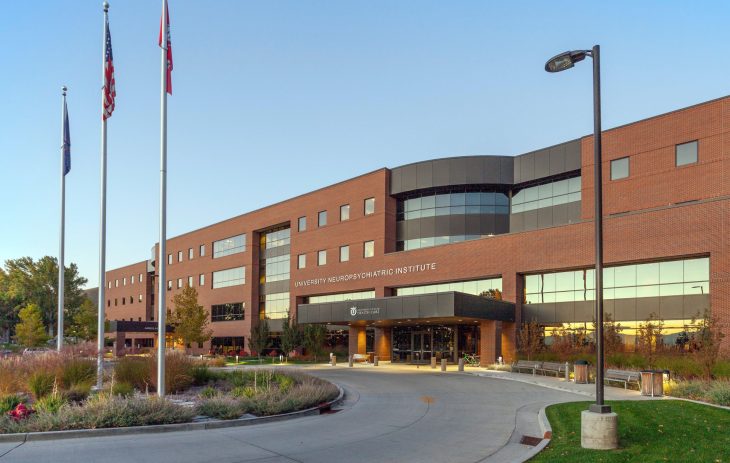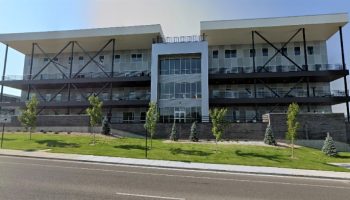About Huntsman Mental Health Institute
Huntsman Mental Health Institute in Salt Lake City Utah offers comprehensive inpatient detox and medication assisted treatment for opioid addiction. It’s part of the University of Utah’s health network. They assist adults and families.
They offer individual therapy sessions in which their counselors can help you deal with underlying issues of your addiction. Your treatment will include a variety of group therapies and daily activities to address the mental and physical aspects of addiction.
You’ll meet with your provider on a regular basis during the first phase of treatment. Working closely with addiction treatment specialists, your provider will decide which medication is best for you. Your case management team consists of a dedicated group of psychologists, social workers, nurses, and psychiatrists who’ll keep an eye on you and help you during the withdrawal process. This team will prescribe the necessary medications to lessen cravings and withdrawal symptoms.
Among the medications that might be used in your treatment are Sublocade, Zubsolv, Subutex and Suboxone. Additionally they can prescribe naltrexone and Vivitrol. These medications effectively reduce cravings and ease withdrawal symptoms. These meds are safe and won’t interfere with your ability to work, attend school, or care for your loved ones if taken as prescribed and under medical supervision.
They collaborate with the emergency departments of South Jordan Health Center and University of Utah’s Hospital to offer a bridge program. You can receive Suboxone treatment for opioid addiction quickly with this program. You can participate in this program twice a year, given that you aren’t receiving Suboxone from another provider.
They accept most insurance plans and offer grant funding to those without insurance.
Levels of Care
-
Inpatient
Inpatient and residential programs provide round-the-clock medical and emotional support as you live at the treatment facility. This level of care may be recommended if you have severe addictions or mental health conditions since it removes outside distractions and allows you to focus solely on therapy.
-
PHP
Partial hospitalization programs provide comprehensive treatment in a structured setting during the day but allow you to return home at night. These programs offer a balance of inpatient and outpatient rehab and provide intensive support without full time residency.
-
Outpatient
In outpatient therapy, you’ll attend therapy sessions several times each week while living at home. This is ideal if you have a strong support system and a lower risk of relapse. Outpatient treatment offers flexibility to maintain work, school or family obligations.
-
Aftercare
Aftercare programs provide ongoing support after you complete a rehab program. They may include several components to help you maintain sobriety including therapy, community support groups and relapse prevention strategies. This gives you a network of resources as you reintegrate into your daily life.
-
Dual Diagnosis
Dual diagnosis programs address substance use disorders and co-occurring mental health conditions simultaneously. This integrated approach to care improves the likelihood of long term recovery and stability by addressing the root causes of addiction.
Detox Service Setting
-
Inpatient Detox
Inpatient detox occurs in a dedicated treatment facility. You’ll live there around the clock and receive intensive medical support and supervision to help manage your withdrawal symptoms. It is suitable for individuals with moderate to severe addictions as it ensures a stable detox environment.
-
Outpatient Detox
Outpatient detox gives you access to medically supervised withdrawal services while still allowing you to live at home. You’ll attend a clinic for treatment and monitoring. This flexible option is suitable for those with mild to moderate withdrawal symptoms who have strong support systems.
-
MAT
Medication assisted treatment combines medication and counseling to manage withdrawal and reduce cravings for opioid and alcohol addiction. Medications may include methadone, buprenorphine or naltrexone. MAT is tailored to your needs so you can actively participate in your treatment journey.
Programs
-
Adult (18+)
Adult programs address the substance use and life challenges specific to adults. Therapists can deliver sessions in individual, group and family settings. Services often include job support and life skills training in a structured environment.
-
Alcohol Detox
Alcohol detox programs offer medical support to help individuals withdraw safely from alcohol. Your care team may use medications to ease your symptoms and provide medical monitoring to address complications.
-
Cognitive Behavioral Therapy
Cognitive behavioral therapy focuses on changing harmful thought patterns and behaviors associated with addiction. You’ll learn healthier coping mechanisms by identifying and replacing negative thoughts. This improves your emotional resilience and decreases your relapse potential.
-
EMDR Therapy
EMDR stands for eye movement desensitization and reprocessing therapy. It helps you process traumatic memories that may underlie addiction. You’ll learn how to reduce emotional distress and begin healing from past events. This makes it effective for trauma related addiction causes.
-
Men
Men's programs address substance use while also considering the social pressures, family roles and mental health concerns that are specific to men. You’ll learn healthy coping mechanisms as you build emotional resilience and develop communication skills.
-
Opioid Detox
Opioid detox uses medications to ease severe withdrawal symptoms. It also includes medical supervision to help you manage potential complications. These services allow you to stabilize and begin a recovery plan.
-
Seniors (65+)
Senior programs address the unique needs of older adults like chronic pain, grief and isolation. Programs include peer support and medical oversight for age related health concerns. The goal is to improve quality of life and promote sober aging.
-
Women
Women's programs offer a safe and supportive space to focus on gender specific issues such as trauma, family roles and mental health conditions. Therapists tailor the sessions to address women's needs and foster empowerment in a healing and nurturing environment.
-
Young Adult (18 - 25)
Young adult programs are designed for individuals who are transitioning into adulthood. Topics of discussion typically include identity, independence and peer relationships. Providers may also offer life skills training and career support.
Payment Options
- Medicare
- Military Insurance
- Private Insurance
- Self Pay
Accreditations
-
 SAMHSA
SAMHSA
Amenities
- Mountain Views
- Music Room
Contact
501 Chipeta Way
Salt Lake City, UT 84108





